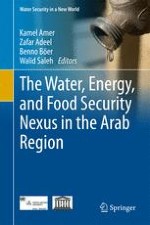
2017 | OriginalPaper | Chapter
1. Status of Water in the Arab Region
Author : Waleed Khalil Al-Zubari
Published in: The Water, Energy, and Food Security Nexus in the Arab Region
Publisher: Springer International Publishing
Activate our intelligent search to find suitable subject content or patents.
Select sections of text to find matching patents with Artificial Intelligence. powered by
Select sections of text to find additional relevant content using AI-assisted search. powered by